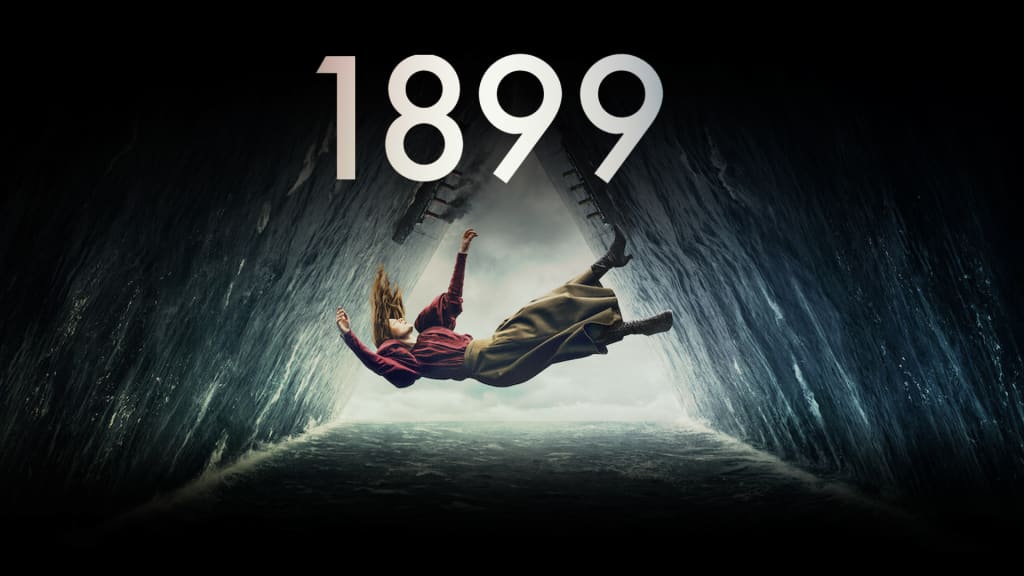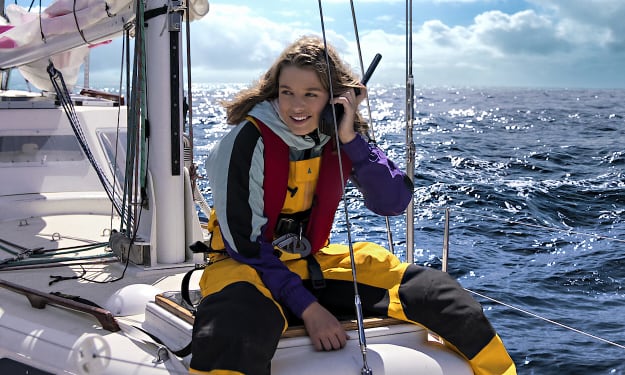
Jantje Friese and Baran bo Odar may not be household names, but they are arguably two of the most influential figures in streaming. Their sci-fi series Dark was Netflix’s first German-language original and proved a hit with audiences and critics across the globe, paving the way for Squid Game, Lupin, All Of Us Are Dead and a more global outlook to programming.
Two years after the finale of their time-travelling, parallel universe-incorporating conspiracy drama – and a brilliantly clever conclusion that somehow solved the grandfather paradox – the Dark team return. Their new series, 1899, is another horror-mystery puzzle box with a sci-fi edge. In this case, the setting is a grand steamship crossing the Atlantic, where class keeps various segments of the passengers from interacting. 1899 is set 13 years before the Titanic came afoul of an iceberg, but the parallels are clear, with roaring engine rooms and a preternaturally still ocean that the characters attribute to it “sensing death”.
The ship itself is sinisterly named the Cerberus, after the many-headed monstrous dog that was said to guard Hades. To make matters more ominous still, four months earlier a ship on the same voyage vanished without a trace. That ship, the Prometheus (equally sinisterly named after the Titan doomed to spend eternity having his liver devoured by an eagle), lets off a distress signal that is detected by the Cerberus mid-voyage and, after a short debate, it is decided that the hell dog ship and eternally tormented titan ship should finally meet.

Aboard the Cerberus is a motley crew from around the world, and the series is performed in French, English, Cantonese, Polish, Portuguese, Spanish, Danish and German. At the centre of the rabble is Maura Franklin (Emily Beecham), a doctor with a mysterious past, while the moral compass is provided by Ramiro (José Pimentão), a Spanish priest also fleeing a mysterious past. The ship itself is captained by Eyk Larsen (Andreas Pietschmann), who is haunted by visions of his own, you guessed it, mysterious past. Each actor has a natural screen presence, particularly Yann Gael as ex-soldier Jerome. But the ensemble struggles by not being distinct enough from one another, with each actor’s emotions running the narrow gamut of confusion and/or anger. Despite a myriad of languages being spoken, most of the dialogue seems to be just filling time between sci-fi plot machinations. With the tone repeatedly playing from such a limited selection of notes, the plot twists can’t compensate for how oppressively dour it all is.
In the six episodes of the eight-episode season made available for review, 1899 throws a lot of ideas at the wall. There’s travel through time and space, secret portals, creepy children and a light sprinkling of pro-immigration politics, but the pacing is ultimately more confounding than the sci-fi. Episodes range from languid to gruelling, crawling towards the next plot point with a frequently agonising level of restraint. This becomes lightly comical by the midway point, where there are such long pauses between the spartan dialogue that they may as well just count out the number of minutes the episode is contractually obligated to take.

The victims provide little insight into events beyond puzzled expressions followed by a breathy “None of this makes sense”, and even the villains speak in abstract, only alluding to their motives with lines such as: “They need to shift their perspective to see the whole scope of things.” By the time the 100th character has been cut off just before they were about to learn the truth, it’s hard to know whether to be annoyed or impressed by how steadfastly obtuse 1899 is. But the detrimental effect of its vagueness is no better embodied than when, following a harrowing series of deaths, a character inexplicably announces that they “don’t think they are really dead”. It might do just enough to keep the sci-fi possibilities open, but it ends up detracting from the power of the tragedy we just saw.
If Dark is anything to go by, it’s worth holding out hope that the series’ conclusion will be its apex. But given the six hours of required viewing ahead of the final act, it’s unlikely that the adventures of the Cerberus will capture the imagination of international audiences like Friese and bo Odar’s maiden voyage did.
… as 2023 gathers pace, and you’re joining us from India, we have a small favour to ask. A new year means new opportunities, and we're hoping this year gives rise to some much-needed stability and progress. Whatever happens, the Guardian will be there, providing clarity and fearless, independent reporting from around the world, 24/7.
Times are tough, and we know not everyone is in a position to pay for news. But as we’re reader-funded, we rely on the ongoing generosity of those who can afford it. This vital support means millions can continue to read reliable reporting on the events shaping our world. Will you invest in the Guardian this year?
Unlike many others, we have no billionaire owner, meaning we can fearlessly chase the truth and report it with integrity. 2023 will be no different; we will work with trademark determination and passion to bring you journalism that’s always free from commercial or political interference. No one edits our editor or diverts our attention from what’s most important.
With your support, we’ll continue to keep Guardian journalism open and free for everyone to read. When access to information is made equal, greater numbers of people can understand global events and their impact on people and communities. Together, we can demand better from the powerful and fight for democracy.
Whether you give a little or a lot, your funding is vital in powering our reporting for years to come.
Jantje Friese and Baran bo Odar are among the most prominent figures in the streaming industry. Their ground-breaking German-language series Dark captivated audiences worldwide, leading the way for global programming such as Squid Game, Lupin, All Of Us Are Dead. Two years after the conclusion of Dark, the duo has returned with their new series, 1899.
Set on a grand steamship named Cerberus, crossing the Atlantic, the show depicts a society divided by class, with characters speaking multiple languages, including French, English, Cantonese, Polish, Portuguese, Spanish, Danish and German. The main character, Maura Franklin, played by Emily Beecham, is a doctor with a mysterious past, with Ramiro, a Spanish priest, serving as the moral compass. The ship is captained by Eyk Larsen, portrayed by Andreas Pietschmann, haunted by visions of his own mysterious past. Although each actor delivers a strong performance, the ensemble cast struggles to stand out from one another, and their emotional range is limited.
The show introduces a multitude of ideas, including time and space travel, secret portals, and pro-immigration politics, but the pacing is confusing, with episodes ranging from slow to grueling. The victims provide limited insight into the events, and even the villains speak in abstract terms, leaving their motives unclear. Despite its obtuse nature, 1899 keeps the sci-fi possibilities open, but its vagueness detracts from the tragedy depicted.
… As we approach 2023, we at the Guardian have a request for our readers in India. The new year brings new opportunities and we hope for stability and progress. As a reader-funded publication, we rely on the support of those who can afford it to continue providing clear and independent reporting from around the world.
Unlike other news outlets, the Guardian does not have a billionaire owner, allowing us to report the truth with integrity. This year, we will continue to work with determination and passion to bring you journalism that is reliable and accurate. Invest in the Guardian this year to support fearless reporting and independent journalism.
About the Creator
Mohan Ramu
"A movie review should not only reflect the reviewer's personal opinion, but should also consider the wider cultural and social implications of the film."
"A story is a way to say something that can't be said any other way."





Comments
There are no comments for this story
Be the first to respond and start the conversation.